
It may have some minor subplot issues, but is still an utterly underrated Kdrama
Go Ah-in (Lee Bu-young) is a no nonsense woman whose only purpose is to do her job as a creative director in an advertising agency in the most perfect and flawless possible. At first glance, she was able to finally achieve her ultimate career goal when she was promoted as the first woman to be an executive director (Chief Creative Officer/CCO) at her company. However, Choi Chang-soo (Jo Sung-ha), Go Ah-in's superior had another plan in mind.At first glance, 대행사 (Agency) is an office drama comparable to Misaeng, but given with a company director's POV instead of an employee's. Both are great in their respective stories, and just love them both.
But for this show specifically, I love that it has a fast-paced flow and deals with the intricate office politics and complex world of the creative industry well, especially for people without creative industry background like me. Each episode increases tension between the main characters, and their rivalry really makes the plot interesting. One may think that this "rivalry" may be tiring for the remaining episodes, but with the addition of new stories and characters along the way, the story just keeps more interesting as more layers are being uncovered.
It's also great to know their respective characteristics and alliances on each factions in the office politics drawn early on. It may be seen as boring as we already know which side a side character is, but it didn't bothered me as much.
Jo Eun-jung (Jeon Hye-jin) is the most "fleshed out" character other than Go Ah-in in terms of her background story. It's quite remarkable to see how she is able to balance out her duties in the office, despite her son's disapproval for his mother to work and resign instead. Also, it's great to show that despite her dilemma, she is fully backed with support by her husband and mother-in-law. With this stigma against working mothers in a conservative yet competitive Korean society, it's quite good, if not refreshing, to know how this show addresses this issue. But then again, I didn't like that the MIL and the father wasn't that helpful to Eun-jung in convincing the son for her to work.
Personally, I knew what the outcomes would be, but would is still gagged with how each outcome are shown. It's like knowing that there would be a plot twist, but doesn't know what that plot twist would be. This is true most particularly with the presentation cliffhanger at episode 8.
The only production lapse that I noticed was during a throwback scene on the second ep where the creative office used modern-type computer monitors when it was set in 2004.
After the 1st half, this show now focused to complex corporate drama and chaebol problems care of Kang Han-na (Son Na-eun). She has an eccentric character and seems reckless on the outside, but is actually smart, if not cunning on the inside.
One complaint is that it would have been better pacing-wise had Han-na be developed into someone who can stand on her own despite facing failures, rejection, despair and loneliness. The romance subplot was just too transactional and there were virtually no chemistry between her and Park 부장. But if the writers really decided to insert this storyline, it would have made more sense had it was inserted towards the end (at least the last 2 episodes). I would have no complaints even if it was rushed since then again, I can't see the chemistry of said romance.
Being nit-picky as well, there were some things that this show failed to explained more. First, is Ah-in and her mother's story. After the episode 12 confrontation, I really hoped that there is more to be discussed and more emotions be shown to really have a a fulfilling closure on their issue. It ended even only through a text, which was appalling since it was built-up very well on the earlier episodes. Second, Ah-in and the budding romance with the CEO of a gaming company. The spark was already there and Ah-in could've enjoyed said romance, but it was just forgotten midway. What happened?
The ending was satisfying in a way that it wrapped the main stories very well, in a compelling but not overdramatic fashion. Yes, it was expected, but then again it was executed perfectly in such that it was not boring. The last episode was very engaging in terms of portraying the cooperation of Ah-in and Han-na for their "common enemies". It was the definition of women empowerment in a society where men are still dominant in many corporate aspects.
Still, every episode ended with a bang. I think the reason why it has a lower MDL rating is due to its delayed subbing. It's very surprising how this is not picked up yet by major international streaming platforms given its high ratings in Korea. It may have minor subplot issues, but is still an utterly underrated Kdrama.
SIDE NOTE:
It will be an unforgettable watching experience for the last 2 episodes. At times, I was reading English subtitles, and at others, it was Indonesian. I was really able to maximize my Korean and Indonesian skills just to get the gist of what they were saying. Still, it is a very rewatchable Kdrama and I enjoyed watching it despite some minor subplot issues.
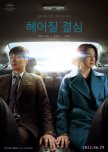
Aberrant romance and captivating mystery that leads to making a difficult decision to leave
A multilayered neo-noir with a dash of eccentric yet almost inappropriate romance. This film conveys an outlandish narrative wherein the rigid, workaholic police officer Hae-joon (Paek Hae-il) obssesses then falls for the main suspect of a murder case he is investigating, Seo-rae (Tang Wei).The first half was not immediately engaging, but it was able to successfully build-up tension between the complex lead characters while in a middle of an intricately-created murder mystery. What I find unique here compared to previous Park Chan-wook's filmography was that I was able to follow the plot easily compared to some of his works yet there were still subtle context clues and nuances that I had to think twice. Unfortunately, the second half was not able to hold the same calibre of obsession and tension as the first half. For me it was quite draggy, and the runtime could've been shortened since it already had a tight and suspenseful first half.
Also, the well-thought cinematography helped the overall quality. It was carefully crafted which was very prominent on the scenes where Hae-joon was imagining he was on Seo-rae's side. The camera angles and shots amplified his obsession towards the case and towards her as well. The foggy weather, the mountain and the sea (based on the Confucius quote mentioned) striked to me and perhaps to the storyline as well.
Aside from that, I highly applaud Tang Wei's performance here. It's the first time that I watched her and the fact that she's not Korean but speaks the language suprisingly well, together with her morally-gray characterization, speaks amounts of her effort as an actress to nail the role. Park Hae-il's performance is also nothing to be brushed off. I think that this might give him a nomination for this year's Baeksang, if not win just for that final scene where he was able to portray anguish and longing emotions (very well).
Overall, a great movie despite with its fuzzy moments. This may not have the same quality as Oldboy and The Handmaiden, but Decision to Leave creates a distinct caliber that proves why Park Chan-wook definitely is a master of this craft. The neo-noir element was not as intense as the aforementioned movies, but the addition of the aberrant romance and captivating mystery ultimately proves why there was a difficulty to make a decision to leave.

Offered a fresh perspective to an overused royal politics-type sageuk
Was instantly hooked after the tension-filled episode 1, and was looking forward for what it has to offer. From that moment, I knew that this will not be a typical sageuk despite having the same cliche-filled elements.The first few episodes tackled on stories that were not even present on previous sageuks. Not only that it was refreshing to watch, but it made me curious what would happen next. Each episode on the 1st half really ended on a high note, making the endless plot-scheming, dirty tactics, and 3D chess by the Queen worth it.
Speaking of the Queen (Kim Hye-soo), she really was the star of this show. There was no other actress who could've matched the tenacity, bluntness, and boldness all at the same time, gradually showcasing the queenly mother vibe that she flawlessly portrayed. The Queen was really atypical for Joseon and maybe eccentric for the time period, but her progressive views and her deep understanding on her children, and later, towards the other princes and their concubine mothers, maybe the reason why the umbrella was constantly expanding, keeping everyone safe under her umbrella. Not to forget, the eyebrows were just phenonemal, as if it was another actor. The eyebrows alone were enough for her to be nominated for Baeksang.
Moreover, Queen Dowager Cho (Kim Hae-sook) was also a force to be reckoned with. She certainly was as dirty as a typical sageuk antagonist, but one thing certain for her was that it was all for her son, the King (Choi Won-young), or was actually for herself? Anyhow, she really pulled all the strings to stop the Queen from being her obstacle, and the two of them was almost yin and yang in terms of their energies. It was very gratifying to see them Queens bickering with each other upfront, rather than the subtle and silent "war" previous sageuks portrayed in terms of queen and queen dowager relationship.
On the other hand, I was not so sure with how it handled the "rebellion." It was mildly disappointing as the ones behind it planned it meticuluously and the build-up was greatly done, as if it would succeed. Its resolution was more on the anticlimactic side, and it was rushly wrapped. Because of that, it also rushed this show's ending in terms of its political aspect. However, the other subplots were given appropriate, sometimes fluffy but not cringe endings. Basically, this was my only complaint to an otherwise great kdrama, almost a masterpiece. Other than that, no pacing and direction problems. Topnotch.
The cinematography was another highlight. Its camerawork (most notably the first 2 episodes) was just masterpiece. It was very cinematic and it really captured the essence of the emotions and mood on those particular scenes well. The music scoring was great as well.
Overall, what an exhilarating watch! This might be the best Kdrama for 2022, and will just wait for it to garner awards. It deserves so since Under the Queen's Umbrella offered a fresh perspective to an overused royal politics-type sageuk.

Full of angst, yet also full of confusion?
I was drawn at the beginning when there was just an ooze of mystery covering around Moo-yeong as to what could be his role regarding the suicide/murder at the first episode, what his secret is, and most importantly, what was his role on Jin-kang's life. This kdrama is a great example of arousing questions to the viewer's mind in the beginning to be carefully peeled off as the plot progresses.For the succeeding episodes, I felt that my interest towards the aforementioned plot points waned a little bit, and just wanted to know how they really are interconnected. Yes, it was a great plot point to showcase who Moo-yeong really is, why there is always angst with his interactions with every character including Jin-kang, but most especially to Jin-gook, and I really like how his sociopathic tendencies were played out, creating this sense of mystery around him. The air of suspicion as to who really killed the girl on the first episode was actually what was only my reason for my overall interest for this kdrama not to totally disappear. It's just that I was just disinterested on the love triangle subplot in the first half, and my disinterest just grew more when it was hastily ended on episode 8, albeit in a shocking way. I get the accident was horrific and that it would be a transition point for the part where Moo-yeong would be able to feel "love" towards Jin-kang. With Moo-yeong's sociopathic tendencies in mind, I actually remembered Lee Joon-gi's role in Flower of Evil from him and I liked both portrayals of being sociopath, both male leads having "grey" characters, and how they were integral for the plot.
Also, I'm 50-50 for the "I can fix you" trope portrayed by Jin-kang to Moo-yeong after episode 8. I guess it was better for Seung-ah to die for them to end up together (?) but the sudden shift of this relationship and Jin-kang only having a short time to mourn her best friend's death to suddenly having feelings to her boyfriend didn't check the mark for me. But at the same time, I also felt it was necessary (?) for that plot point to really embark the more important point of this story, which is the romance between the leads, and finding the answer on what really happened on their characters years ago leading to that moment.
Actually, I already guessed what the "mystery" portion for this kdrama would be despite knowing late that this was actually a remake of a Japanese drama. The introduction of new plotlines and just the hastily ending (it's really more on covering up) of the previous plotlines just to go to the end was the opposite on what I expected when I mentioned earlier about uncovering the necessary details to answer the mystery that is its plot. At that point, I was just confused as to what direction it is going towards. Spoiler alert, I was actually gagged when it was revealed that Jin-kang and Moo-yeong were "siblings", but having also my jaw dropped when it turned out that he was just being toyed by Se-ran just for fun (her having also sociopathic tendencies like Moo-yeong could've been explored more actually). Though it could've just been explained right away by Jin-gook to Moo-yeong that he was wrong to think that on their first "altercation", but again, I was just confused basically on Jin-gook's thoughts at that point (I actually even thought that he had feelings for Jin-kang but thank God it turned out nothing, it was just based on his irrational actions.)
Despite the confusion and the growing disinterest that I felt on the build-up to the last episode, I actually think that the ending was properly executed, and was just appropriate. There were already hints given that I thought might lead to its ending, and I was correct, with the major one being the "I wish I could be reborn" quote by Moo-yeong. Without exploring deeper what the plot points and loopholes that made me confused and disinterested with the last part, I actually felt at ease watching that ending, since I think that they could now be together without any problems, LOL, but I also just could not think what would happen to Jin-gook afterwards. It wrapped the story well with that ending.
The first thought that came to my mind after the last scene was actually that this kdrama is like a math problem in high school, I don't know how I was able to derive the answer with its solution, but nevertheless, the correct answer.
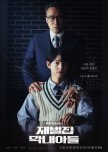
Reborn or repent rich
What I thought would be a typical revenge story with a fantasy twist turned out much more - explaining in detail the complexity of human greed and how it can affect things for better or for worse.The 1st episode explores the life of a loyal servant of the Soonyang corporation, by the name of Yoon Hyeon-woo, and up to what extent can he extend his loyalty to the corporation. This episode honestly did not made a "splash" for me, even its ending where he "transported" back in time as Jin Do-joon. In fact, there was this brewing bias inside me thinking this kdrama may be not for me, yet at the same time, I also thought "why not?" and just continued to watch the succeeding episodes just for fun.
Starting with episode 2 where in Do-joon (with the mind of Hyeon-woo) would now be able to revenge for his untimely death in the present timeline, it was already obvious how the plot would progress and where does it head to. All of the actions he has done to make the Soonyang empire crumble into pieces although with the expected setbacks but still would be successful due to his meticulous planning with the help of Mason Oh of Miracle Investment, were already predictable yet still thrilling to watch and made my heart pound for a bit. Honestly, I was confused on the financial games and chaebol schemes but was still entertaining to see that he was now slowly achieving his revenge. I thought this kdrama would plateau by episode 10 or 11, with his "inevitable" succession as the new chairman of Soonyang - and in that way, would now be able to achieve his revenge, but then again, I was wrong (and gladly).
It was episode 11 (especially its ending) and the next episodes (up to 15) where the epitome of this kdrama is. It was in this episode where Do-joon/Hyeon-woo's humanity really showed. His relationship with his grandfather, really is the highlight of this show. I would not be exploring details about their "duo" to make this review spoiler-less, but the tough love Do-joon's grandfather gave to him from the preceeding episodes could've made him more focused to do his revenge up to the genuine care Do-joon have for him especially in this part, showcased another side of Do-joon that even greed could not interfere. After all, it was not the grandfather who instigated Hyeon-woo's murder, one could say, yet it is important to know that the Jin Yang-cheol is Soonyang, and Soonyang is him, as what he strongly said even in the peak of his weakness.
Forward to the penultimate episode (its ending) was epic. The "truck of doom" trope of kdramas for this show was already plenty, but this show really leveled up this specific trope, in which I would like to upgrade it to "the sandwich truck of death". I actually gasped at the end of episode, anxiously waiting for the last episode.
After watching the last episode, I mumbled to myself "was that it?", feeling disbelief with what I just watched. I immediately looked for reviews and comments regarding the finale, and was not surprised to see many negative reviews about the ending, with some outright saying the overall show is bad. I actually agree with the comments for the most part, especially with its build-up but just culminating to the rushed hearing part, the unrealistic smoking gun evidence, and the mastermind facing no consequences with what he did (well, I now understand why Seong-joon became crazy) just for the sake of plot convenience.
But with the buzz going on regarding the finale and the show as a whole, I have come up with a different perspective with regard to this "messy" finale. Hyeon-woo, with him being reborn as the youngest heir of the company he spent 20 years being loyal to, now having the knowledge on what would happen in the future while he is on the past timeline, used his new identity to plan his revenge and eventually get said company away from those who instigated his murder from the present timeline, which he actually did. Also at the present timeline, he was now able to repent on his unjust deeds while working at Soonyang (although not properly executed and just plothole alert), and ultimately win at the end, but did he really repent? How about him being an accomplice to the crime that led to Do-joon's death? That's another topic that would deviate away from this review.
As a viewer, I know that the premise of this show is actually about Hyeon-woo and his revenge, thus being reborn as Do-joon. However, I was more invested with Do-joon and his relationship with his grandfather, Yang-cheol, which what was shown for the most part of this kdrama (episodes 2-15), and became its highlight. Him now coming back as Hyeon-woo, then repent(?) and would later get his revenge is the inevitable and logical solution to end a great kdrama, but with all the plot conveniences (the convenient recording from a flip phone in 2004 and evidences to implicit the corporate crimes) and messy execution just to arrive to the end, disappointment is an understatement.
P.S. Min-yeong (and the actress) was severely underutilized in this kdrama. Although I liked that the romance part was not much emphasized here, but her role as prosecutor could've been explored more. She was casted in a main role, but was instead given a supporting role.

Not so entertaining to watch, except the last two episodes
Go Youn-jung's "replacement" as the main female lead was actually done very well. Initially, I was ready to be disappointed with this shift, but her mannerisms and innocent-looking amnesiac aura made me realize that she was fit for the role. Even I was able to recognize her as Naksu immediately. She was able to retain the charm of Jung So-min while portraying the character of Mu-deok/Naksu (of course, as the role of Naksu was written for Youn-jung). But then again, I was frustrated that she was again relegated to be fragile and more of an eye-candy when in fact, Naksu was a vicious, merciless, yet skillful person in the first place. The amnesia shouldn't have been an excuse. Besides that, She (the actress) definitely was the surprise for this season.Other than that, I was generally disappointed with how this season turned out. Yes, it was able to answer the fundamental questions from the first season which is the reason why my score for the story is not that low. But, it was full of plot conveniences that initially confused me (Seo Yul's blood parasite problem being solved right away), followed by prolonged dragging of cliches (amnesia, passive aggresive romance, and noble sacrifice being the top culprits) that could've been compressed by at least 2 episodes, and ended with noticeable plot holes that buffered my brain (Park Jin being able to close the door of Jinyowon despite him not being part of the Jin family, among others). The story shifted for the majority of this season, and it only decided to return to the main story during the last 2 episodes.
I was also upset for that it only had few, but still memorable action scenes in this season, partly because of the prolonged building up of tension rather than the action itself. Although, it was vindicated by the last 2 episodes, as the action scenes were breath taking, still I wanted more. The CGI were also top-notch, but it felt that it was only reserved for said last 2 episodes, and budget was only an afterthought for the rest of the season. The wardrobe here were not as sophisticated as the 1st season, but the accessories and the props (relics) were definitely an upgrade.
Speaking of the prolonged tension build up, it was baffling in that everything could've been solved right away, and even the "ultimate" battle was just finished easily. Jang Uk (Lee Jae-wook) was not even sweating during that "battle". Again, deux ex machina overload all over, which definitely killed the ending's potential to be a future classic. It was as if there was more talk than action. Personally, it might be due to the overexposure of the romance plot and its cliches which felt like filler rather than building blocks of the main story. Still, the last 2 episodes are the saving grace for this series all things considered.
Another gripe is Jin Mu (Jo Jae-yoon). How is he still not captured or even dead already? I wasn't really convinced with the reason behind that, and he just was a plot armor. Not a memorable villain as a character, but great delivery of lines and emotions as an actor.
There were still positive comments here, most notably the improved acting of the Hwang Min-hyeok as Seo Yul. He was now able to expand his acting range here compared to the one-dimensional emotionless acting on the first season. Still, there is room for improvement. Also, it was hilarious to think that the Crown Prince Go Won (Shin Seung-ho) had an unexpected character development. Not only that it was lowkey funny, but it was refreshing for me thinking about it due to its being unforeseen.
All in all, still a disappoinment with how this season turned out. Despite my lackluster reception for the first season, I was still optimistic here because of that cliffhanger. However after watching this, I was able to conclude that this season felt that it had a separate story from its predecessor, and as a series, it looked like it has two stories in one.
My review title for the first season was that it was entertaining to watch...at 2x speed. Here, it would be: not so entertaining to watch, except the last two episodes.
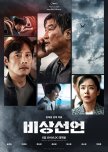
A precautionary tale for possible bioterrorism, but a mindless one
A bluish, hazy lens flare focuses to a young man inquiring about a flight that would have the most passengers in the busy Incheon airport on a busy summer day was not the strongest opening for a disaster movie. Yes, one might be curious for that young man's intentions, but the camerawork obstructed me from focusing on the screen. Instead, I just couldn't wait for a normal camera angle and coloring.However, it redeemed itself with the succeeding scenes once the lens toned down. The tension about the apparent "attack" is now building up as the said young man is now trying to pull out the trigger for a what seems to be a bio terror attack on a plane bound for Honolulu. Also, the passengers of said plane whom he would victimize are now being introduced on the screen. I felt pity towards them being innocent on what would happen next, but at the same time, I couldn't take it much seriously knowing that there were also teenagers aboard wearing their uniforms on their way to vacation.
This disaster movie, as with most disasters, is divided into 2 parts: the 1st half talks about the disaster itself and its victims; and the 2nd half is about the consequences of that disaster to its victims, and the society to an extent.
The 1st half was purely genius in terms of balancing grit, suspense, and thrill. The outcome was already predictable, yet it felt that it was not. Im Si-wan's portrayal as the young man mentioned earlier named Ryu Jin-seok was absolutely terrific in terms of characterization. He really was fit for the role of an innocent-looking yet dangerous and narcissistic terrorist, and he was able to convey the necessary emotions well. Also, the plane attack in itself was brilliant in terms of how carefully-planned it was. The pacing from the first scene at the airport towards the attack itself was spot on, if not top notch. The attack though, felt too abrupt when it was done, and I was wanting for more intense scenes.
Meanwhile, the 2nd half now focused on the consequences of said bio terror attack and how the passengers and air crew dealt with it. It had the same pandemonic vibes as "Train to Busan", but unfortunately, this movie took the story potential for the worse. It attempted to compress several actions into one big story which dragged the movie's run time. The events that occured post-attack felt too emotional and illogical, even for the basic movie viewer like me. It seemed that there was a different approach for the direction, but ultimately turned out to be unnecessary.
The movie could have been more impactful had it been more explicitly tragedic. A sad outcome based on the events of the attack and its consequences to all of the plane's passengers and crew would have been more logical and acceptable. The "vague" ending in itself felt safe to be open for interpretation. As the credits rolled, my first thought was that this movie wasted immense potential and that it could've reached the same critical response as "Train to Busan" or even beyond, but it did not.
On the other hand, I have to commend the well-shot scenes inside the plane. The movie showed different angles and perspectives of the plane on air, and added tension to the impending disaster. Korean disaster movies are really world-class in terms of showcasing the disaster itself and really convinces the viewer with its great camera work aside from the mentioned earlier.
비상선언 (Emergency Declaration) overall was like the air turbulence shown in the movie, it was bumpy. It tried to incorporate several genres within a disaster movie, but it was not successful in doing so. It wasn't able to maintain the amount of thrill and suspense it had at the first half, but was still able to portray action thanks to its talented star-studded cast, despite some ending up being under utilized.
In the end, this movie served its purpose - to be a precautionary tale for possible bioterrorism, but a mindless one.
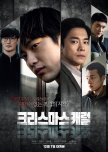
A horrid and depressing story of revenge
The first scene was just anguish overload. It introduced a grief-stricken Il-woo (Park Jin-young) seeking to avenge his twin brother's death. Park Jin-young's conveying raw emotions of grief and anger during the first 5 minutes was just flawless. It was just applauding that he was able to get rid of his flower boy Kpop idol persona and transform into a dirty, gritty, and morally-ambiguous character. "A Christmas Carol" is the pinnacle of his acting chops and just proved his versality. Basically, PJY is the highlight of this movie and deserves an award nomination at least.For the plot, it had a stable direction while it focused much of its first half on the violence/revenge part then addressing the problem on the second half. There are several trigger warnings and some people won't be able to digest or feel the same rage as me while watching it. If one could be able to get past through the first hour without having the urge to end it, the second half, although darker, would be interesting to watch.
It was emotionally-investing to see Il-woo's journey in achieving justice for his brother's death. The flashback scenes shed some light but at the same time, just felt utter pity towards Wol-woo's plight. Il-woo's realization later on was just heart-breaking, as with most scenes towards the ending.
Could've been better in terms of tension build up especially when it was revealing who was behind the crime. The reveal was still good, it was somewhat surprising but it also felt disjointed in terms of its execution. But when everything was then connected, it now all made sense, and it being gory is such an understatement. For seasoned movie watchers though, the "plot twist" could be already seen a mile away.
Even with all the horrible events all throughout the movie, the ending still provided a glimpse of light. Only a glimpse, since it doesn't yet evoke a societal-level change and the court verdict was questionable, but still a glimpse, since it triggered a talk, if not a controversy about this movie and its story. Maybe it can be a catalyst for such gruesome incidents to be stopped and prevented in the future. With that in mind, I think this movie was able to tell its message to the viewers quite well aside from few wonky sequences and story telling on the later part.
It's not obvious based on the final outcome, but this movie actually faced severe restrictions from the Korean movie board and had to be revised four times before being finally released. Yet despite the fact, 크리스마스캐롤 ("A Christmas Carol") was still able to portray a horrid and depressing story of revenge.
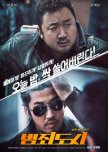
Adequately entertaining to watch
Gang wars in the middle of Seoul with police intervention that involves gritty chasing and action scenes is nothing new. Additional elements added is that this movie is based on a real-life mop op operation on a Chinese-Korean gang. Will this add flavor to an otherwise common plot?As usual with police films, a cause is needed for them to take action. It was slow at first, and at times, quite hard to follow due to the overlapping of the gang members and their turf, but once the cause was determined, it became procedural in terms of pacing and the direction. Basically, the outcome was already predictable. The journey towards said outcome should be presented well, and I think for this movie, it was done satisfactorily. But at the same time, I was bothered for the small amount of tactical scheming present here, and the scenes that they were scheming on how to catch the criminals were not as entertaining as I hoped it would be. It may be due to the lack of a shocking plot twist, that I'm not sure. On the other hand, there were slapstick comedy scattered and I also had chuckles here and there.
Police captain Ma Seok-do (Ma Dong-seok) was definitely this movie's highlight. His ability to play a strong and harsh yet dependable cop together with his magnetic presence in the screen really stood out here. Based on his previous roles, it may now be somewhat obvious that he is being typecasted to play the same macho yet reliable good guy roles, but in this case, no one else could've the role better than him.
The antagonist, Jang Chen (Yoon Kye-sang) was for the most part, able to reach the same amount of energy as Seok-do. It would've been better had the two main characters had a longer confrontation action scene, but still it was good that he (YKS) was able to deviate from his usual good guy roles. The long hair though, was not it. Did just not fit him.
As what you may have noticed in this review is that I put more emphasis on the actors rather than the story itself. In fact, there were quite many repetitive aspects and cliches on action police flicks present here.
To answer the question earlier, at some extent it did add some flavor to the movie itself but that is mainly due to the presence and acting of the main leads. The journey however, was already procedural, and the outcome being already predictable, but was still adequately entertaining to watch.

Rough around the edges, but still a hidden gem
Having an engaging opening episode is important in any drama/movie. The concept is quite new but to be frank, I wasn't hooked by this Kdrama initially. It really took some time (around episode 4) before I warmed up it since there was something that still kept my attention, almost like a hidden gem.The charming Park In-seong (Chae Jong Hyeop), despite now being the company president, is portrayed in the most realistic way wherein he can still commit mistakes but is capable of developing himself more by adapting to the fast corporate environment. He has to "wiggle" himself between two sides of the same coin (Bumyoung vice chairman and executive director) while at the same time, trying to save the previous president Kim Seon-joo (Park Sung-woong). I was very pleased with his character and the actor himself, but to be honest, I wasn't really convinced by his acting during the more serious moments. It felt forced and foreign to him to convey more serious emotions which is in contrast with how excellent he carried the more comedic and light scenes. Still, CJH has more time to polish and he is a very promising actor.
It was refreshing to see that sub-plots - mostly the obstacles that In-seong and company dealt - were wrapped neatly within one episode and questions were answered right away. Also, since there were only 12 episodes, they did not drag certain problems unneccesarily. I liked that they were smart on how to deal said problems right away. There was a little bit of deus ex machina, but it was executed quite well.
The romance between In-seong and Se-yeon (Seo Eun-soo) was really given some time to bloom. After all, this was not the main plot, but the glimpses of their brewing romance shown per episode created a slight suspense as to when they would end up together. At times, one might think whether the "romance" part is necessary as it only has a secondary relevance to the overall story, but for me, it added some "flavor" and made the plot more tolerable, as well as providing relief during the heavier scenes.
I also loved the relationship between In-seong and his parents. I hoped that his parents could've been given more ample screen time but their relationship with their new companion, Baro 4.0 was also entertaining and wholesome.
The greatest character development has got to be Ma-pi (Kim Sung-oh). I really thought that his role would be ended after the debt would be played. I really commend that his character was given depth with a proper background story and is able to explain to us why he has come to have a macho, uber-cold external persona. Yet the writers did him dirty big time, and that also affected this show's quality to be honest. It's only here in this Kdrama where the peak was on a specific episode, then greatly went downhill the episode thereafter. The succeeding episodes were already expected and nothing new, but there was something already lacking at that point, and I suspect this is due to the aforementioned.
Although the production value is sub-par in Kdrama standards compared to other shows in the same genre (at times, camera shadows are present), it redeems on the story pacing. I like how the comedic, thriller, corporate, and romantic aspects among others are balanced out, and improves the overall direction of the plot, for the most part.
For the antagonists' side, I wasn't really convinced with Oh Mi-ran's (Lee Sang-hee) characterization. The twist as to who the real villain is was not surprising to be honest, but the real villain's wickedness could've been more amplified. It just lacked the "oomph factor" that could've challenged In-seong more.
My ultimate concern for this kdrama is that whether Kim sajangnim will still able to recognize In-seong for the things he has done in his behalf. Will not provide spoilers but I was contented with how it turned out. The ending was realistic and proper in all aspects. It wasn't rushed but it also wasn't significant to be remembered for a long time.
All in all, Unlock My Boss really is a hidden gem. It is not perfect in all aspects. Rough around the edges, but still a hidden gem.
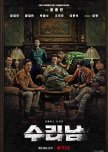
Watch it not for the story, but for its perfectly-amplified tension
Kang In-gu (Ha Jeong-woo) is a simple father who just want to provide the best for his family by doing business abroad. Jeon Yo-han (Hwang Ju-min) is a pastor, who at a first glance, seems to be passionate in delivering the word of God, is actually masquerading not only as a drug lord, but is THE drug lord of Suriname. Choi Chang-ho (Park Hae-soo) is a law enforcement agent who wants to catch the pastor and end specific drug cartel before it enters the Korean market. The three main characters reflect the different facets that were emphasized in this series: money, drugs, and justice, respectively.After becoming familiar with the backstory of the main characters particularly with In-gu, I was intrigued with how this will pan out in terms of who he would side with at the end. Also, with Chang-ho's stoic character, I was anxious whether he was an ally or another Pastor Jeon. The intensity of having to wait the definite morality of these characters is what made me hooked on the first 2 episodes. Narco-Saints tries to convey that money is really hard to resist as well as the drug (cocaine) business itself, which Pastor Jeon even described as "natural blessing from God."
The plot itself was not really deep and at times, predictable even with the twists. Emphasis on the drug, guns, action, and betrayals though was spontaneous and executed well for the most part. Since this was encapsulated into just 6 episodes (which I think is Netflix standard) suspense and thrill on every character's actions and their next steps towards closing the "deal" were most commonly felt. The action scenes were intense and gripping. Most importantly and I think is this show's highlight, the tension was high all throughout which was amplified more during the last three episodes. It was perfect in that sense and is the main reason I just can't stop watching on the screen.
The production quality was great in that I only found later on that this was actually filmed in Dominican Republic instead of Suriname itself. Imagine the attention to detail given in making the location believable, especially when both countries speak different languages. I was amazed by that fact. Even with the obvious CGI (helicopters, fighting jets), it wasn't really distracting. The color grading though, is very typical in genres like this. One gripe would be the transition between the fight scenes which was passable at best, shaky at worst.
I thought that it would also have an open ending (which unfortunately is now becoming a Netflix Korea trend), but I appreciated that the main story was aptly closed. However, the side plot on the cult part with the other members "trapped" inside it was just forgotten after a build up on episode 3? What happened to the little girl who went to In-gu for help? How about the other members of the church/cult who remained? What happened next to the lady deacon?
Also perhaps an unpopular opinion but I wasn't really able to follow the English conversations with Ha Jung-woo and Hwang Jung-min. At first, I had to increase volume to maximum to hear them, but still wasn't able to fully understand. Had to rely to context clues on specific conversations where they spoke in English. To be fair, English is quite difficult for a native Korean speaker to even learn, and them speaking it despite the "difficulty" speaks their passion and love for their craft. Personally, I ought not judge because English is also not my first language. My suggestion would be for Netflix (or any other streaming platform) to still put English subtitles for English dialogues in the future.
Overall, a seemingly passable action series that was really carried by the characters and their individual goals. I really liked that the main story ended without cliffhangers, yet questions about some aspects of the plot weren't answered (for me, not a reason for a season 2.) Watch it not for the story, but for its perfectly-amplified tension.
P.S. I did a background check on the story which inspired this series, and it was actually more dangerous and even dramatic with what was shown, at least for the real person where In-gu was based on. I suggest you do the same, and do some comparisons between the drama and the real-life event.
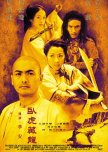
A great introduction to Chinese movies
First chinese movie to be watched ever, and actually had some expectations since it is critically-acclaimed and is considered by many to be a classic.The premise of the story was rather simple, yet it was interesting to know how the romance plot of shu lien and li mu bai would uncover and i thought it would really focus here but was wrong (and for good reasons, plot wise, but i also really couldn't connect with them immediately since they were not presented well enough to really root for them). The martial art scenes especially at the beginning was really thrilling, exciting to watch, and refreshing (since i was exposed more on the korean action story-telling before this movie). The pacing was rather good and it was moving as quick as i anticipated it to be, with the green destiny sword always being lost and then recovered and then lost again, to li mu-bai's plan to avenge his master's death by killing jade fox, and jian long/jen's romance with xiao hu (which i actually wanted more but the backstory was already good and gave ample background for their connectiom with each other). The highlight here would really the spontaneous yet gripping martial art scenes especially the "flying" transitions since it was executed really well and the bamboo fight scene between li mu bai and jian long, add to that the realistic and well-shot settings (just loved the scenery of xinjiang and the desert).
Aside from that, jian long/jen's character was notable in here. She really was the embodiment of a crouching tiger since she doesn't want to conform on her obligations as an aristocrat's daughter to be a simple and abiding wife to a "pompous aristocrat" (verbatim from her) and a hidden dragon with her skills as a swordsman and a martial artist. I really liked how her character (as bratty as she was) was developed. Also props on the emphasis of the movie itself in having strong women characters and the less dependence on men on having to save them, and how consistent their characters from start to finish.
One thing that i would've wanted the film to showcase more would be the reason why jade fox became the antagonist as she was, since li mu bai's master's death may have been justified by here, but the undercover police's death wasn't and i didn't heard anymore from his daughter after her father's death. Also, the ending, as realistic and sad as it was (was really hoping that jian-long did not die and xiaohu's story would also apply to her), but was less impactful as i would've anticipated it to be.
Nevertheless, a great watch for the most part, it is actually a great movie, but to be considered a classic is still something i personally couldn't agree, for now. However, this movie is an eye-opener for me to watch more chinese movies.
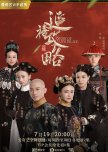
Sets a high bar for Chinese historical dramas
After watching Nirvana in Fire (which was really great, I still hold upon my review for this show), this drama was what was the most recommened follow up to watch within the same genre. And when I read its synopsis of having a revenge story in a historical setting, I was already hooked. Initially, I watched this for its revenge plot, not knowing what lied ahead.Chinese FLs tend to be meek, submissive, overtly cute-sy, just a typical Cinderella complex type of character. This is what was on my mind prior to watching this drama. After all, this was based on what I read while scrolling in this review site. It was also one of the reasons why I avoided Chinese dramas for so long. However, Wei Yingluo was the totally opposite of what was mentioned. She came to the Forbidden City with an identity, and remained there still with her identity intact. She didn't allowed the behemoth number of obstacles to fail her mission. She was smart, cunning, cold on the outside but warm on the inside. Genius is a gross understatement for her character.
What I also loved about this drama is its pacing and plot development. The numerous conflicts in the royal harem all throughout its 70-episode run, on paper, could've been boring since it was formulaic at times, but the execution were done really well. There wasn't any deux ex machina involved and the plot twists, were realistic in that a smart person could figure it out, and Yingluo is one such smart person, so... Intriguing is a gross understatement for the story's pacing.
Furthermore, the characters were really fleshed out. One special mention would be Royal Consort Gao, who was as villanous as one can be. But in depth, there was a reason why she was who she was. Her characterization was really thought out well, and she is someone who I will not forget anytime soon. Interesting is a gross understatement for the characters.
Production-wise, this was really one of the better Chinese productions and is comparable to Korean high-budgeted dramas. Its technical aspects (cinematography, lighting, camerawork, music) were aesthetically-pleasing, and enough for a drama. The CGI was actually very decent. But one aspect that I really commend was the wardrobe. It was just divine to watch, and was really able to capture the essence of Qing dynasty fashion. Qing dynasty was not the best among the Chinese dynasties fashion-wise, but this show represented its best attributes very well. It was just ethereal and magnetic in the eyes, except the men hairstyles.
My slight criticism for this drama is that it wasn't able to maintain the intense tension for its last episode. It was still cleverly written since it circled back to the reason why Yingluo entered the Forbidden City in the first place. But, it could've been more impactful, which was what I was expecting. Nevertheless, the ending was still very great, wonderful even.
This show solidified my awe and admiration for Chinese historical dramas. They are as straightforward as they can be. No unneccessary back stories, and focuses on the present dilemmas. There are a plenty of royal shenanigans and betrayals, which is a staple for this genre. Story of Yanxi Palace, for one, sets a high bar for Chinese historical dramas.
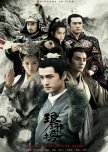
Starts absolutely confusing, yet ends absolutely riveting
This is the first Chinese drama that I've ever watched, so I am really new to everything about their storytelling style. Yet, after watching the last episode, I was just left to ask: "What took me so long to watch it?"A really common comment about this show is on how really confusing it is during the first 5 episodes. It was very confusing in that I had to search for a "relationship tree" picture between the characters to get the context. Furthermore, the story at that point can be understood, but for the most part, I was just clueless about what was happening, who's who, and why is that happening.
However, what made me start to invest here is that it isn't shy in focusing more on the main story (which is in contrast with Korean dramas that adds subplots to further add the story). The pacing here was neither fast nor slow burn. It really took its time in developing the events surrounding the main character, and then wraps up with heavy impact. Also, it did not relied on plot twists and deus ex machina, which made it more realistic in terms of the characters' decision-making. It was just refreshing to me as a viewer to see letting the story flow on its own organically.
One would think that this show's 54-episode run can be a turn off especially when there is only one main story. The erratic cliffhangers were just enough to really make my scratch my head, wanting for more episodes. KDramas and its dramatic cliffhangers just cannot compete here.
Speaking of the story, I absolutely loved how great it is. Once I was able to grasp the details around it, I was frequently reminded of "Game of Thrones" and was just in awe in terms of the parallelism and the context similarities of the two. Both are equally great in giving tension, drama, and royal politics, but this show in particular, was in top notch in portraying royal politics well. It wasn't too complex, yet it also wasn't too cliché. It still gave room for the watcher like me to think profoundly about their actions, and still enjoy its entertainment value at the same time. Also, the action and martial arts was just top notch, and the fighting skills are just chef's kiss.
The ending was what I expected it to be, but I would have appreciated it more had it followed the Korean 1-hour episode format. I found it to be too condensed though it was able to answer the questions and close the story pretty well.
Given all the praises, why would I not rate this drama a 10? Well, here comes a disadvantage when watching a show focused on a single major story - it tends to become redundant. There were quite many flashback scenes (particularly of the Chiyan army 13 years prior the story setting), and at a point, I was already tired seeing it. The scheming of plans also tended to move slow, despite the brilliant outcomes. It was more emphasis on talk, therefore more screentime and less on the action. But when the action scenes came, I wasn't able to think anything but be speechless.
Since this is the first time I am watching a Chinese drama, I don't have any idea how to perceive this show in the grand scheme of things. Nevertheless, I will set this show as the standard for my future Cdrama endeavors. Can't wait to watch more shows like Nirvana in Fire that starts absolutely confusing, yet ends absolutely riveting.
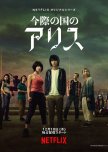
Messes the viewer's psyche, but also messes its story's logic
This is the second Jdrama that I have ever watched, so I really don't have a solid opinion about their storytelling technique as of now. But based on my "background knowledge" on animes, I have come to conclude that Jdramas, especially for this genre, know how to portray gore and violence well. This show was not an exception.Fundamentally, it shares the same root as Squid Game in that it is a survival show where morality is often questioned and often times, it's grey. They both focus on how the main lead would push through several challenges/games, and ethical dilemmas along the way, then ultimately survive in the end. However, the best distinctive characteristic for this particular show is that it focuses more on the narrative and its story, rather than the people around said narrative and story (which is not the case for SG). My opinion for SG is that it focused too much on the characters rather than the story, and that is what I loved on its Japanese counterpart.
The best episode for this show has got to be the 3rd episode. I won't be sharing how the events happened for this specific episode, but it was just messed up, to say the least. And it being messed up and its unexpected outcome was just brilliant in the storytelling perspective. I utterly gasped as the credits rolled, and just couldn't properly function for some time.
Moving forward though, there were some illogical events and inconsistencies on its story. The screenwriter was not able to properly grasped the game's complexities, therefore some plot holes appeared here and there. I want to make this review spoiler-free, and to be honest, said inconsistencies are not that obvious on its first watch. But then again, when it is becoming quite prevalent, one would question whether it is really just a coincidence or already an inconsistency.
Furthermore, I was just impressed on the male lead's character development. Arisu (Yamazaki Kento) came a long way from being a wimpy loser into a strategic and mature person. But at the same time, was quite disappointed with the female lead's character development. Usagi (Tsuchiya Tao) fell prey on the "strong FL at first, but became dependent on the ML later on" syndrome, and I was quite disappointed on that. I hope it changes on the 2nd season since the dynamic between them is already great. By the way, I am already predicting a romantic subplot later on.
But, the most obvious letdown here is the plot twist as to who the game master is. I was appalled when the person's identity was revealed at the end. Yes, it was surprising and shocking. But unlike its Korean counterpart, the show did not invested some story and emotions on said person, yet I am hoping that this would be tackled more on the next episodes.
Despite all that, Alice in Borderland (今際の国のアリス) is still better than SG in that it was consistent on the story that it wanted to tell. The gore and violence was much extreme and bloody, which in my opinion, made this series more thrilling and gripping. Each episode was just different, and the level on shock increases as more that I watch this. Still, I just can't visibly omit my criticisms for this series and also can't say that it's miles better than SG. Overall, this Jdrama messes the viewer's psyche, but also messes its story's logic.











